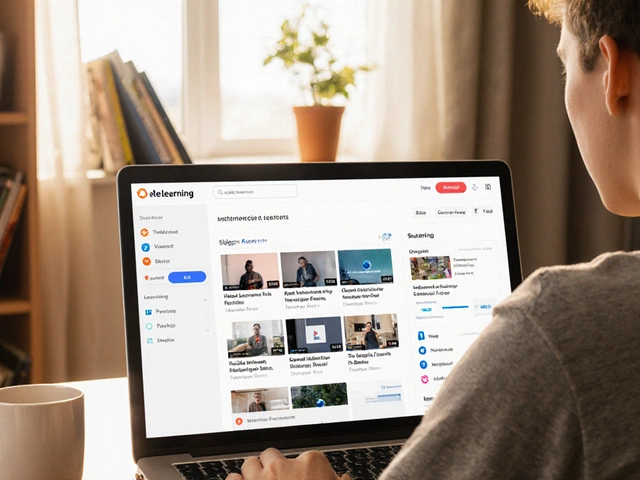So you've heard the rumors: coders make a ton of money. Not just the tech wizards at Google or Meta—regular folks too. There's a reason those job offer memes keep popping up, with tales of junior programmers raking in six figures. It's not hype, it's happening, and there's a pretty simple reason behind it.
The world runs on code right now. Your favorite pizza app? Someone built that. The traffic light system at city intersections? Yup, that's programmed too. Out of nowhere, almost every part of daily life started relying on people who know how to talk to computers. The demand for these people shot up fast, but the number of coders? Not so much.
This creates a giant gap. When every industry—from banks to fashion—needs software, but good coders are rare, the pay jumps. Companies aren’t just competing on perks and ping-pong tables. They’re straight-up fighting with salary offers because not having the right coder can mean millions lost, or winning against rivals.
But it’s more than just demand and supply. Hiring a talented programmer can literally change the game for a business. That’s why, if you’re thinking about picking up some coding skills, you’re not just following a trend—you’re stepping into a gold rush that’s nowhere near over.
- Why Coding Skills Are in Hot Demand
- What Makes Coding So Valuable to Companies
- Breaking Down the Paycheck: What Really Drives the Big Bucks
- How You Can Cash In: Practical Steps for Learners
Why Coding Skills Are in Hot Demand
Go anywhere—every industry wants coders these days. From grocery stores rolling out mobile apps to hospitals managing digital records, tech projects don't wait around. Businesses have to keep up, so they're always on the hunt for people with coding salaries and programming jobs at the top of their minds.
The numbers back this up. The U.S. Bureau of Labor Statistics put out a report that said jobs for software developers are expected to grow 25% between 2022 and 2032. That’s way faster than most other gigs. Why? Because almost everything now depends on software, from payments to personalized shopping.
Let’s look at a few key reasons coders are in such high demand:
- Digital Transformation: Even old-school companies—think banks, insurance, or airlines—are moving everything online. They need coders to build and keep things running.
- Automation: Companies want to save money and move faster, so they invest in automation, which always needs solid programming underneath.
- Startups and Innovation: Every new app, SaaS product, or gadget needs someone writing code. Startups depend on engineers to turn ideas into reality fast.
- Cybersecurity: With more tech comes more security risks. Skilled coders help lock things down and stop hackers in their tracks.
And here’s something a lot of people miss: coding isn’t just for the IT department anymore. Marketing teams, sales pros, and even creative folks are picking up programming to automate tasks or analyze big data. It’s no longer some mysterious club—everyone’s getting in.
| Industry | Percent of Coders Needed (2025 projection) |
|---|---|
| Finance | 28% |
| Healthcare | 19% |
| Retail | 17% |
| Manufacturing | 15% |
| Education | 11% |
If you’re wondering if there’s a catch—nope. The world just needs way more coding power than it currently has. That’s why coder pay keeps climbing, and coding classes are usually packed.
What Makes Coding So Valuable to Companies
If you've ever wondered why coding salaries can look outrageous, it boils down to value. A single skilled coder can save a company time, money, and headaches while unlocking new ways to reach customers. In the digital age, their impact multiplies.
Picture this: a fast-loading website can mean thousands more customers. One programming mistake, though, can crash systems for hours and cost a fortune. In 2023, Amazon lost almost $100 million during a 40-minute site outage. That’s the power—and risk—tied to code.
Good programmers aren’t just typing out instructions. They design secure systems to keep data safe, automate boring (and costly) tasks, and dream up whole new products. Your bank app that lets you deposit a check from your couch? Coders built that. When stuff works well, most people don’t even notice—it just feels easy and right. That’s the magic companies pay extra for.
"Software is eating the world." — Marc Andreessen, co-founder of Netscape and venture capitalist
He’s not kidding. Even industries like farming and shipping now run on apps, sensors, and data analytics. Companies shell out big money for the best coder pay and programming jobs because:
- They make things scale: Instead of hiring 100 people to do data entry, a coder writes a script that does it in seconds.
- Security is life or death: One security hole can mean leaked info, lawsuits, or losing customer trust for good.
- Innovation wins: The first company to launch a killer app usually wins the market. Coders make those ideas real.
- Maintenance matters: Most businesses rely on custom tools and databases that break without skilled hands on deck.
To see how valuable coding really is, check these numbers out:
| Industry | Annual Loss from IT Downtime |
|---|---|
| Retail | $100,000 - $5 million |
| Banking | $1 million - $9 million |
| Manufacturing | $50,000 - $1.2 million |
For companies, investing in top tech careers isn’t a nice-to-have—it makes real money sense. When the stakes are this high, paying more for the best coders isn’t just smart, it’s necessary.

Breaking Down the Paycheck: What Really Drives the Big Bucks
If you stop a coder and ask them why their coding salaries are so high, they’ll probably point to more than one thing. First, there’s the basic supply and demand: there just aren’t enough people who can actually build software that works at scale. Tons try, but only a fraction get good enough to complete real projects that companies need—and companies are desperate for those folks.
Let’s get concrete. Startups throw big offers at coders because one productive developer can launch a feature that brings in thousands—or even millions—of new users. A good back-end engineer might make an app run faster, literally saving the company money every second it’s online. At a place like Facebook or Amazon, the code you write could impact millions overnight. Companies know this, so they shell out big bucks to lock in talent.
But there’s more than just talent. Experience, the ability to solve weird problems, and being able to work with others all drive up the paycheck. Companies want coders with strong “soft skills”—communication makes a big difference, especially on big projects. So, top programming jobs often demand more than just technical know-how.
Remote work has also changed the game. Now, a company based in San Francisco can hire someone from anywhere, instantly raising the global pay scale. In 2024, Glassdoor put the average U.S. software engineer salary at over $125,000 per year. Some senior engineers at big tech firms make $250,000—and that’s before bonuses and stock. Here’s a quick look at typical coder pay across industries:
| Industry | Median Coder Salary (USD, 2024) |
|---|---|
| Finance & Fintech | $135,000 |
| Healthcare Tech | $122,000 |
| Entertainment/Gaming | $118,000 |
| Big Tech (FAANG) | $160,000 |
| Startups (Average) | $105,000 |
Here’s what bumps up your paycheck even more:
- Mastering hot languages (Python, Go, Rust, and always JavaScript)
- Building real-world projects (not just coding for the heck of it)
- Picking up cloud computing and AI/ML skills
- Showing up with a portfolio, not just a resume
Businesses are ready to pay because if they don’t, another company will. That’s the real story behind those eye-popping programming tech careers salaries you keep seeing everywhere. The wild part? The need for new coders keeps growing, so the ceiling for pay hasn’t even been hit yet.
How You Can Cash In: Practical Steps for Learners
Ready to grab a piece of those juicy coding salaries? Good news: you don’t need to be a genius or have a college degree to start. Here’s a straight-up playbook for turning curiosity into a real paycheck. Skip the fluff—let’s get to the moves that actually make a difference.
- Pick a Language With Jobs
Sure, you can learn whatever you want, but if you’re after the big bucks, focus on what companies hire for. In 2024, Python, JavaScript, and Java are leading the charge. Python is huge in everything from web to AI, while JavaScript rules the web, and Java powers more enterprise backends than you’d expect. - Don’t Just Read—Build Stuff
Hiring managers care about what you can make. Start with simple projects (like a to-do list app), then move up. Put everything on GitHub so you’ve got proof when someone asks “show me what you’ve built.” - Get Smart With Online Resources
Skip the $50,000 bootcamp unless you like debt. Sites like freeCodeCamp, Codecademy, and LeetCode offer serious learning tools. For about $30/month, Udemy and Coursera have pay-as-you-go pro courses with projects and quizzes. - Contribute to Open Source
This is the secret weapon. It’s practicing with real code, plus your name gets out there in the coding jobs world. Just fixing typos in docs or submitting small bug fixes counts. - Network (But Not the Annoying Way)
You don’t need to spam LinkedIn, but join a few Discord groups, tech forums, or meetups. People land referrals all the time from community chats. Sometimes, that’s how someone finds out about a programming job before it even gets posted.
If you’re curious about what these tech careers pay, here are some ballpark starting numbers for new programmers in 2025:
| Role | Avg. Starting Salary (USD) |
|---|---|
| Junior Web Developer | $60,000 – $85,000 |
| Backend Developer | $75,000 – $100,000 |
| Data Analyst (with Python) | $65,000 – $90,000 |
| Mobile App Developer | $70,000 – $95,000 |
Feeling ready? Start small, keep showing up, and remember—no one cares if you make mistakes in your early projects. What matters is sticking with it and building a body of work. These numbers aren’t reserved for a select few. If you can build and solve real problems, there’s a spot (and a paycheck) waiting for you.








0 Comments